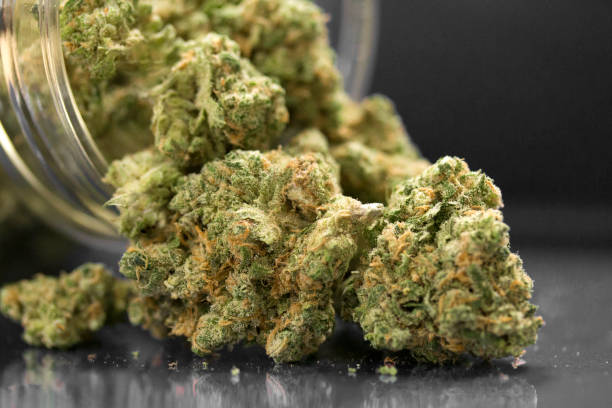
Cannabis is a historic, multidimensional, and sometimes controversial plant. Its versatility and usefulness have boosted cannabis into all kinds of industries and products, especially in the medical field. The cannabis plant has a special quality for producing a family of chemicals which is known as cannabinoids. The two most common cannabinoids are tetrahydrocannabinol (THC) and cannabidiol (CBD). Cannabis plants produce mind-altering effects, which are typically high in THC.THC has been found to affect regions of the brain associated with thinking, pain, planning, learning, emotions and bodily movement. On the other hand, CBD does not have psychoactive effects, but it may also have health benefits. The primary task of cannabis is to regulate appetite, memory, and the immune system, and help to manage sleep cycle and stress levels. This happens because THC molecules from cannabis can actually bind to receptors belonging to the endocannabinoid system. This means that when an individual uses cannabis their endocannabinoid system gets activated, and when the endocannabinoid system gets turned on, the individual may feel the effects of cannabis.
1. Lowering blood pressure
2. Reducing inflammation
3. Preventing relapse in drug and alcohol addiction
4. Treating gastrointestinal (GI) disorders
1. Brain Development Issues
2. Higher Likelihood of Depression
3. Risk of Social Anxiety Issues
4. Risk of Psychiatric Disorders Like Paranoia and Schizophrenia
5. Problems With Memory and Cognitive Function
6. Cardiovascular and Heart Damage
CBD is also famous for lowering the blood pressure of human participants, which helps in reducing the resting blood pressure. It is also helpful in improving other conditions, which may involve mental arithmetic, isometric exercises and the cold pressor test.
CBD is also famous or proven for reducing inflammation and neuropathic pain which is caused by damage to the nerves. This type of pain is common in diseases, including multiple sclerosis, injuries like herniated discs and infections such as shingles.
As per the study of 2018, CBD can be useful in managing people who suffer from drug and alcohol addiction. Moreover, a pre-clinical trial with lab rats determined that CBD reduced the stress-induced cravings, anxiety and lack of impulse control that often cause people to relapse.
As per the current study, CBD and other non-psychoactive cannabinoids are effective for preventing GI disorders, which include irritable bowel syndrome ( IBS), inflammatory bowel Disease, Crohn’s and ulcerative colitis and more. However, the anti-inflammatory properties of CBD helps to reduce the symptoms of GI disease.
Products like cannabis vape concentrates, edibles, resins or brittle-like substances known as shatter or crumble have incredibly high levels of THC, which is considered as the primary psychoactive ingredient in Cannabis. In addition, every person discovers or uses cannabis in different ways, at different ages, and with changing tolerance levels. This means that each person is likely to have different reactions and perceptions of the drug. On the other hand, there is still a long way to go with performing proper and accurate research for understanding all of the positive benefits and negative side effects of cannabis.
There is evidence that smoking cannabis as a teenager is more harmful than any other way. It happens because the brain is not fully developed around the age of 25 and can negatively impact the future development condition. Moreover, one brain imaging study found the irregularities in the prefrontal cortex, which is an area of the brain that helps in making decisions. While this area of the brain naturally gets thinner with age, some studies also show that the area gets more thinner among teens who smoke cannabis or weed and could have a lasting impact till they become adults. The idea that pot affects the teen brain into adulthood is one of the more alarming side effects of Cannabis, which is why teens and young adults are strongly recommended to stop using cannabis before they enter an older age.
According to the Mayo Clinic, researchers indicate that cannabis users are diagnosed with depression and anxiety in comparison to those who do not use the drug. While there is still no clear evidence that cannabis directly causes depression and other mental health conditions, different drugs may affect individuals differently, such as giving anxiety, frustration or serotonin conditions. This situation is also common among people who already have depression, and they use cannabis to cope with symptoms, which can help in the beginning, but over time, this makes the condition of depression worse than before a person started using cannabis.
THC can also be used as a psychoactive substance, but it can actually increase a person’s anxiety instead of soothing and relaxing them. Those with pre-existing anxiety disorders have a higher risk of weed-induced anxiety and are not recommended to use cannabis. On the other side, teenagers who might use cannabis as an alternative to pot or other drugs, after leaving cannabis, might increase their level of anxiety. This can lead to an unhealthy and damaging dependence on substances.
Research shows an increase in the chances of developing some form of psychosis in users who ingest high-potency cannabis regularly. However, this does not mean that using cannabis can cause schizophrenia or paranoia in a majority of users. On the other hand, individuals with a family history of psychosis, schizophrenia or other mental health conditions are encouraged to avoid using cannabis because THC may trigger chemical changes in the brain that can lead to mental health problems such as cannabis induced psychosis.
The primary psychoactive ingredient is THC, which attaches itself to cannabinoid receptors and other areas of the brain like the hippocampus, amygdala and cerebrum cortex that are associated with memory. That is why cannabis users tend to suffer from short-term impairment of psychomotor function or physical functions that require conscious thought to perform difficult tasks, such as driving. The drug also affects a person’s working memory and executive functions temporarily. Although the researchers and experts say that cannabis may cause short-term memory loss when used for a long period.
Research has shown that people with existing heart disease may often develop chest pains due to the regular use of cannabis or smoking weed rather than avoiding it. The side effects of weed and cannabinoids are known to raise heart rate, dilate blood vessels and make the heart pump even harder. This also means that the risk of heart attack among users is higher in the hour after smoking cannabis than their normal health routine, which is also mentioned in an article published in Harvard Health.

This post has been authored and published by one of our premium contributors, who are experts in their fields. They bring high-quality, well-researched content that adds significant value to our platform.


